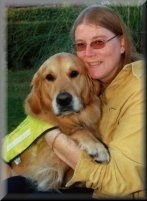
After landing, enjoying the view while we await ground assistance.
Our hosts in Frankfurt were very kind and the conference was excellent; so much to hear and see, so many people to catch up with and so much to learn. We took the opportunity to advertise the IAADP conference which is due to be held in London in June 2008 and got more European members too.
After the conference we spent time with friends in Frankfurt city, and it wasn't too long before we realised that access for people with disabilities and assistance dog partnerships wasn't what we had hoped.
I'd booked us into a four star hotel which had an accessible room, roll in shower, the lot! Unfortunately though, the front entrance looked like this!
 Then there was the extremely heavy door to the corridor of our room, it couldn't be opened by a wheelchair user alone, and the roll in shower ... the floor was so slippery it was a danger to use!
Then there was the extremely heavy door to the corridor of our room, it couldn't be opened by a wheelchair user alone, and the roll in shower ... the floor was so slippery it was a danger to use!As if all that wasn't bad enough, we thought we'd get a few supplies at the local Lidl supermarket. We hadn't gotten beyond the door before being accosted by a couple of members of staff, almost an impasse; they didnt speak English and my German isn't up to much. I did understand "keine hunde" though. Cue, my handy letter of introduction written in German from a local assistance dog training program to explain the very special training and essential role of Caesar ... they went away, they made phone calls, they got a customer who spoke English to ask us to leave! She explained, you do not appear to be blind, I proffered he is an assistance dog, a similar type of thing ... she wasn't listening ... she said it was against the law to allow us in ... we had no choice but to leave.
Later on we checked, and although there is no law to say assistance dogs have rights of access, there is also no law to say they are not allowed ... Lidl should be ashamed of themselves!Thankfully, McDonalds, Burger King, Woolworths and several other shops allowed us in.
What a mess!
To put all this into perspective, it is widely accepted that the modern guide dog movement was started by Dr Gerhard Stalling, in Oldenburg, Lower Saxony, Germany in 1916. 91 years later and an assistance dog partnership still cannot buy a pint of milk!
I guess this illustrates the work ahead of us in Europe to gain pan-European access for all assistance dog partnerships and not just guide dog partnerships.

People cycle far more in Frankfurt than perhaps some other parts of Europe, and there are great cycle lanes; often these are to the edge of the pavement so that the pavement becomes a shared space, marked by white lines. I was very interested to see that on the cycle lane, when there was a junction there were dropped kerbs in place so that cyclists didn;t have to dismount to cross; whereas, almost without exception there was no dropped kerb on the pedestrain bit of the pavement. This means wheelchair users and people pushing baby buggies etc have to cross into the cycle lane to use the dropped kerb ... running the gauntlet of some of the cyclists who have very efficient bells and aren't too keen on slowing down!
Something access wise, which we saw in Germany and have never seen before, was provision within the accessible toilets. Like this one in Frankfurt airport arrivals area.

Not only a multi level monkey pole by the toilet but note the handrails alongside the sink and the adjustable angle mirror. Thumbs up!
So, access and inclusion provision in Germany was very mixed, ranging from the excellent right through to the poor ... I guess the difficulty was that one could never really relax, not knowing whether or not one would be welcome.




No comments:
Post a Comment